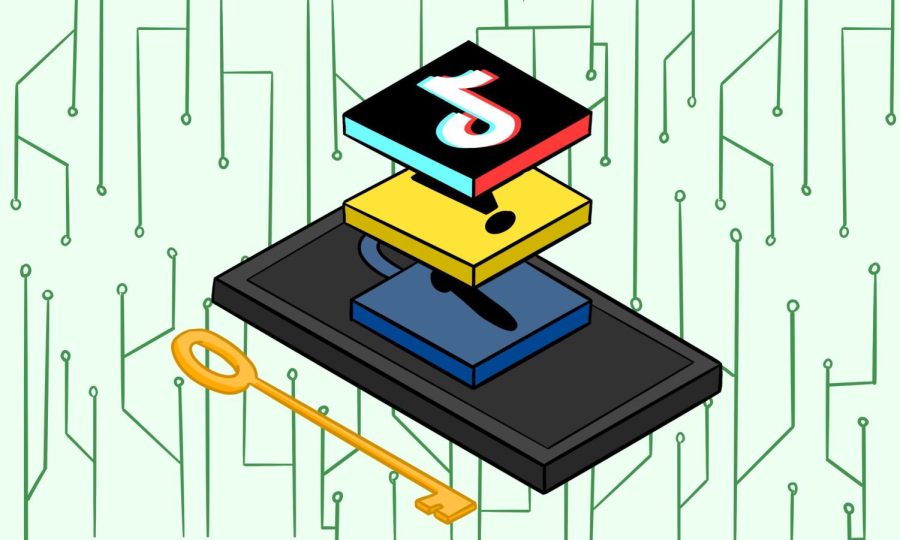TikTok’s global chief security officer Roland Cloutier addresses Buffett Institute for Global Affairs
TikTok’s global chief security officer spoke at the Buffett Institute Tuesday about eliminating cyberthreats. In doing so, the company has encrypted the platform with artificial intelligence technology, and are even letting users in on the job.
April 12, 2022
When the Biden administration publicly shared Russia’s plan for a war in Ukraine weeks before the invasion, social media platforms like TikTok started planning their cybersecurity responses, according to Roland Cloutier, TikTok’s global chief security officer.
But TikTok won’t always have these prior warnings, he added, so the company hopes to anticipate security breaches before they start.
“The world moves at an incredible speed,” Cloutier said at a Tuesday address to the Buffett Institute for Global Affairs. “We have to move at the speed of culture. That’s what our program does.”
Cloutier and McCormick Prof. V.S. Subrahmanian, a faculty fellow at the Buffett Institute, spoke as part of a Fireside Chat series at the institute.
Moderated by Annelise Riles, executive director of the institute, the talk focused on how TikTok combats cyberthreats, focusing on times of war and political elections.
Cloutier said TikTok is keeping up with changes in technology that might pose a threat to free speech.
“I get to protect the world one TikTok at a time,” he said. “I’m at a company where security, privacy and protection is paramount. It’s made for people to be joyful and to do their own thing, and we have to protect that business model.”
Though the company prides itself on allowing consumers to use the app how they wish, Cloutier said this personal agency comes with a risk.
New technology on TikTok like deepfakes, videos made with artificial intelligence software, is a cause for concern, Subrahmanian said.
“You should be able to do something like take a picture of someone and render it as though it was done by an impressionist painter,” he said. “From a national security perspective, however, you worry about people attributing videos of Biden saying something false.”
Calling the current situation in Ukraine the “world’s first TikTok war,” Riles focused the conversation on how the platform moderates dangerous content during wartime.
Cloutier said artificial intelligence technology automatically removes most violent videos before they are posted on the platform.
“If someone is normally based in Chicago, but TikTok sees that their identity is currently in Belarus, and we see it coming from 15 different device types, maybe there’s a problem,” he said.
Though AI has been a key resource for the platform to identify videos that violate TikTok’s community guidelines, Subrahmanian said it’s “far from perfect.”
AI falls short when it has to analyze videos that contain questionable but not obviously vindictive content, Subrahmanian said.
“Often, there’s this place in the middle where the AI says, ‘I can’t say anything about this kind of content,’” he said. “What companies are trying to do is make that middle as small as possible so they don’t have to incur the delays and costs of sending it to moderators. It’s a balancing game.”
Though technology has its limitations, Cloutier cited TikTok’s initiative to make cybersecurity a more interactive experience for users as an extra level of protection.
Sharing the authority to identify cyberthreats with users is an exciting way to engage the whole TikTok community, Cloutier said.
“We put that capability into the billion monthly active users on our platform to have them help us police the community,” Cloutier said. “We want to have them be responsible for their own privacy.”
Riles closed the event by commending the platform’s technological innovations in the ever-shifting world of cybersecurity.
She said these goals align with the mission of the Buffett Institute: highlighting the work of those who are changing the world by finding new solutions to pressing challenges.
“Values matter,” Riles said. “Clearly, this is one of the most important issues in global affairs today.”
Email: charlotteehrlich2025@u.northwestern.edu
Twitter: @charlottehrlich
Related Stories:
— Podculture: Dinner and a TikTok



